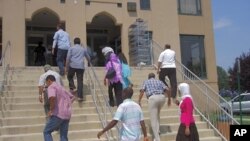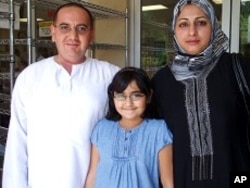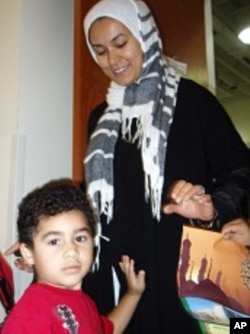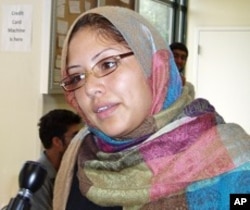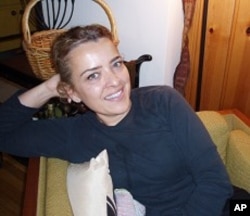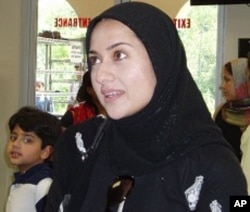Midway through the holy month of Ramadan, Muslims gather at the All Dulles Area Muslim Society, or ADAMS Center, mosque to pray. Located in Reston, Virginia, the center was formed 25 years ago to attend to the needs of the Muslim community.
Deputy Director Khalid Iqbal says people from 15 different countries, including the United States, participate in the center’s wide range of activities. During this time, ADAMS sees a spike in attendance.
“During the month of Ramadan, we also serve meals every evening for breaking fast for almost four to five hundred people,” Iqbal explains. “I think because of the hardship and tough economic times more and more people are coming for that also.”
A touch of home
Iqbal says there are certainly things that Muslims living in the U.S. miss about celebrating Ramadan in a predominately Muslim country -- such as the call for prayer and the sound of chanting coming from inside the mosque. But in addition to providing the spirit of Ramadan for Muslims living in the area, ADAMS center also takes the opportunity to get acquainted with non-Muslims.
“Each year, during the opening of Ramadan we have an ‘Iftar,’ which is the opening of the fast, we have [the] FBI for example – they have been coming here every year and hosting an ‘Iftar’ for the whole community,” he says. “Which is a wonderful thing to do, we have that close of a relationship.”
The ADAMS center Deputy Director adds that “Iftars” are also held for the first responders, like police, emergency medics and firemen. He says it’s an opportunity to share the “blessed month” with non-Muslims in the community.
Peer support helps
Iraqi Wisam Alani, a car salesman, attends Friday prayer service with his wife and nine-year-old daughter. Alani says fasting was hard for him initially, since he spends a lot of time outside in the sun, showing cars to customers. He says what helps is that his boss and some co-workers who are Christian, know a lot about Ramadan and, as such, they are supportive.
“I don’t want to say that I have 100 percent energy, but actually it’s fine because your body gets used to it,” he says.
Alani says what he misses most about celebrating the holy month back home in Iraq is the pervasive experience of Ramadan.
“For example in Iraq, you go outside you can see everybody going to the mosque, you can feel, you can smell Ramadan everywhere – in the markets and all these things,” Alani reminisces. “ Here in the United States, unless you go to the mosque and see the Muslim community nobody knows what is Ramadan.”
Juggling kids and fasting
Sally Hassan, 33, a mother of three young children between the ages of two and six years old, says it’s been hard for her to fast. She practiced ahead of time so her body was used to it. An Egyptian, she says she comes to the ADAMS center mosque to feel more connected.
“We come to the mosque to feel the Ramadan feeling,” she explains. Hassan tries to attend service three times a week, but definitely comes on Fridays, the traditional day of prayer in Islam. “It’s hard to have the kids and pray, so I’m giving the people [fellow worshipers] time to focus on praying.”
From Christian to Muslim
Peruvian Cynthia Dianderas, 22, is a college student and recent convert to Islam. She is one of two people in her entire family who are Muslim. She says she decided to convert for a lot of reasons.
“I found Islam is just my calling… it’s something I wanted to research and find out more about it and once I found out about it, then I felt one,” Dianderas explains.
The young convert says she found fasting rewarding. As an employee of the ADAMS center, Dianderas says she feels supported in her new-found religious tradition, thanks to the hundreds who attend special daily activities during the holy month.
“I’m here at ADAMS during the day and then at night, everybody’s here – we get 500 people here, we serve food – and we all basically break our fast together, as a group… as a community. And then you pray and then you have dinner.”
Skipping the fast
Not far away from ADAMS center, Belkiss Obadia, a Muslim living in a Washington, DC suburb, honors the spirit of the holiday in her own personal way: one that does not include fasting. The Pakistani-born artist is married to a Venezuelan Jew and says when she moved to the United States, she stopped fasting. Obadia says the support and unity she felt during the holy month while living in Lahore, seems practically non-existent here in the U.S.
“During Ramadan you don’t feel a whiff of it because everybody’s kind-of scattered all over the United States…. unless you’re part of the community, it’s just like any other day," she says. "I miss that oneness.”
Guilt free
Obadia says her definition of Ramadan is very different from the traditional meaning, so she has created her own tradition – a modified observance – that she feels honors the spirit of Ramadan, minus the fast.
“You’re not fasting because you’re trying to prove to the world that you’re a good person," Obadia says. "This is about you and a cleansing of the soul and your relationship with your God… so nobody sits and judges anyone – in fact that is one of the sins.”
Obadia says she has never been met with disapproval from her more traditional Muslim friends.
The non-faster says when Ramadan ends, she thinks about the progress she’s made so far, toward being a better person -- a journey she considers difficult and a life-long process.
“It’s all about simplicity, giveness, love, cleansing and hoping that this year that will follow after ‘Ramzan’ [Ramadan] even if I’m five percent better at who I am -- then I’ve won you know, in my soul."
Spirit lingers
Back at the ADAMS center, Rabiah Ahmed, a Pakistani, who works for charity organization Islamic Relief, says she feels sad as Ramadan winds down.
“You really feel like a loss when the 30 days are over, when the month of Ramadan is over,” Ahmed says. “And even though Eid is supposed to be a celebration and it’s supposed to be a time to have fun, part of you is kind of sad you know? That special time is over.”
Elizabeth Monnac's slideshow featuring African and African-American Muslims




